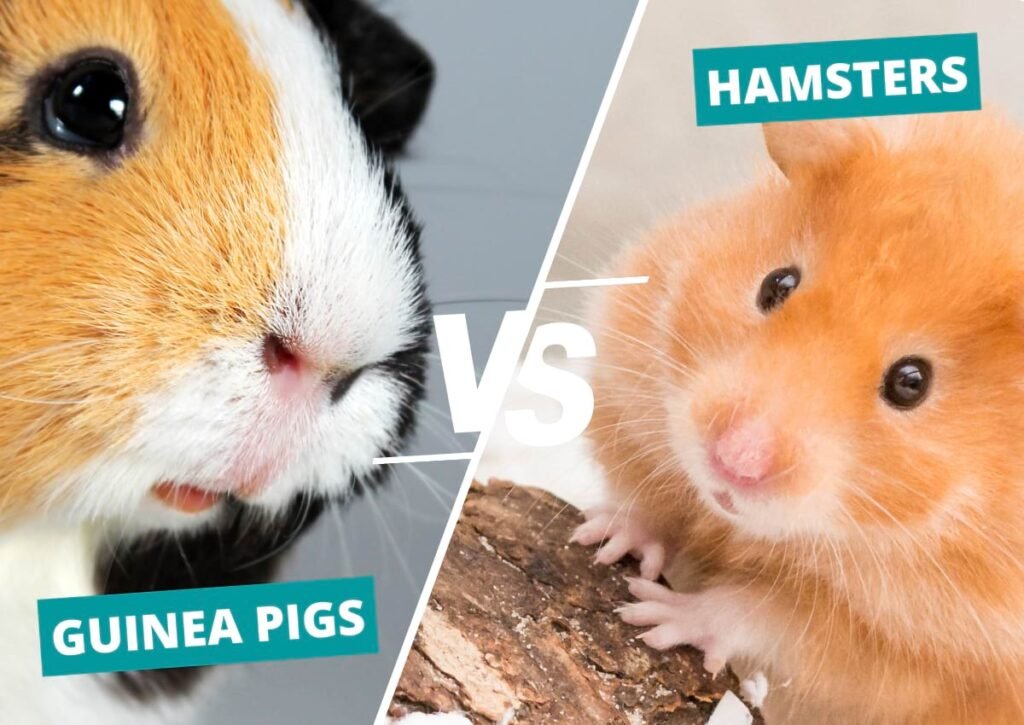Are you considering adding a new furry friend to your family? The decision between guinea pigs and hamsters can be tough, but fear not! We’re here to help you determine which pet is the best fit for you.
Hamsters are solitary creatures that need to be housed alone, while guinea pigs are social animals that thrive in the company of others. Hamsters require less space, food, grooming, and cage cleaning compared to guinea pigs, who are generally more expensive to care for.
In this post, we’ll delve into the distinctions between hamsters and guinea pigs to assist you in making an informed decision on which pet suits your lifestyle.
Guinea Pigs Require More Space
Cages available at pet stores for both species are typically undersized. Hamsters require a minimum cage size of 5.4 square feet (775 square inches).
Guinea pigs, on the other hand, need almost double the space, with the minimum cage size being 7.5 square feet and the ideal size being 10.5 square feet. If you plan on having more than two guinea pigs, you’ll need an even larger enclosure.
Remember, for both hamsters and guinea pigs, a larger cage is always better. Invest in the largest enclosure you can afford and accommodate in your space to ensure your pet’s well-being.
Guinea Pigs Are Messier
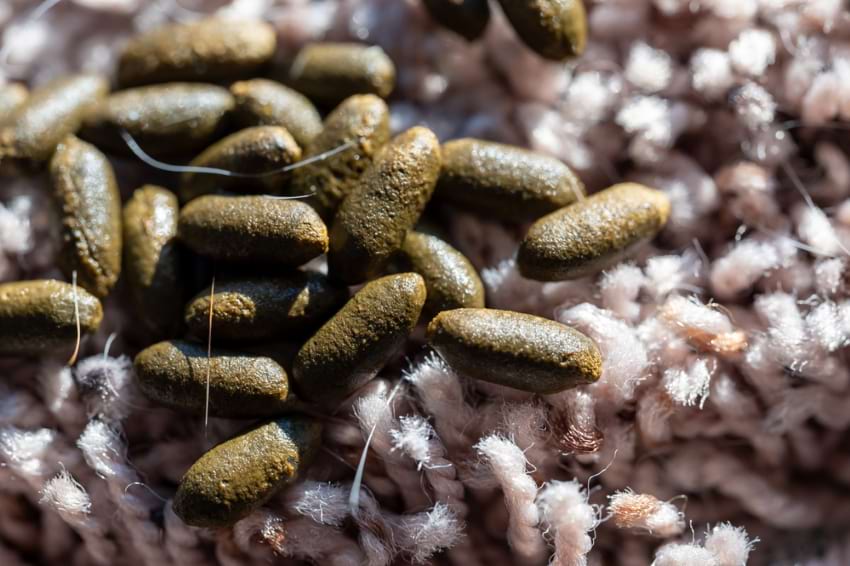
Guinea pigs are known to produce up to 100 droppings per day! They are also frequent urinators and have fast digestive systems, necessitating regular cage cleaning. Spot cleaning should be done daily, with a deep clean at least once a week.
On the other hand, hamsters, being desert animals, urinate less frequently and produce fewer droppings. As a result, their cages require less frequent cleaning.
Guinea Pigs Cannot Be Safely Kept in Glass Enclosures
While large glass enclosures are ideal for hamsters, they are not suitable for guinea pigs. The high volume of excrement produced by guinea pigs can lead to ammonia build-up in enclosed spaces, posing health risks for the animals.
Moreover, guinea pigs are prone to respiratory infections and other ailments when housed in glass enclosures. It is recommended to provide open or fully-gridded tops for their cages, ensuring ample ventilation similar to C&C cages.
Hamsters also require ventilation, albeit to a lesser extent. The level of ventilation needed depends on the cage size, but having at least one vent on each side is recommended.
Hamsters Need to Burrow
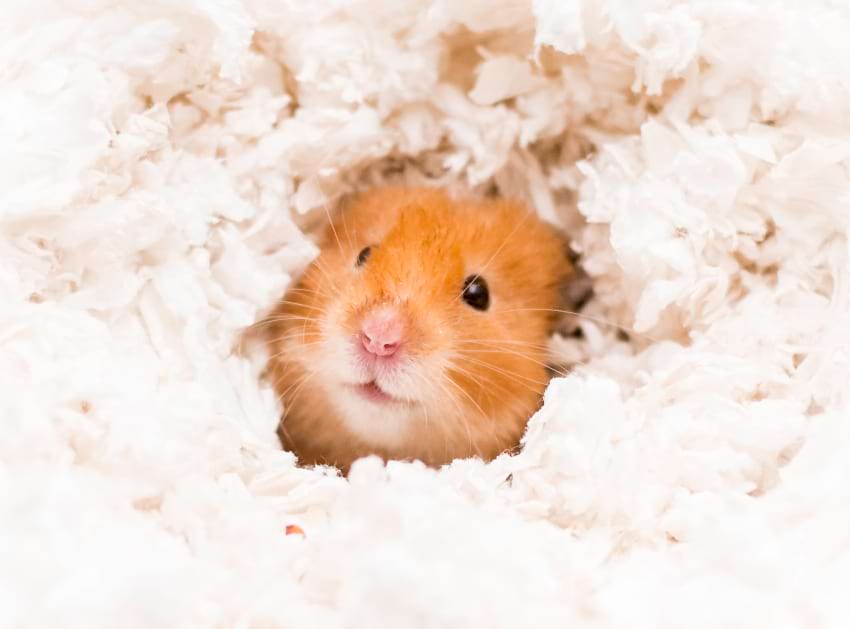
Hamsters require 10-12 inches of bedding to satisfy their natural burrowing instincts.
Guinea pigs, on the other hand, do not require deep bedding for burrowing but enjoy nesting in hay piles or beneath fleece bedding. Disposable bedding for guinea pigs should be 2-3 inches deep to absorb urine effectively, while some owners opt for fleece liners or bath mats.
Guinea Pigs Don’t Escape Enclosures as Often
Due to their larger size and limited climbing abilities, guinea pigs are less prone to escaping their enclosures compared to hamsters. However, improper housing setups can still lead to escape incidents.
Male guinea pigs, in particular, may attempt to escape if kept near females due to mating instincts. It is essential to provide secure lids on guinea pig cages and ensure there are no gaps or grids for them to squeeze through.
For hamsters, secure lids and appropriately sized cage openings are necessary to prevent escape attempts. Providing a spacious cage with enrichment activities can also reduce their desire to escape.
They Require Different Diets
Guinea pigs thrive on a diet of fresh hay, mixed vegetables, and quality guinea pig pellets, avoiding seeds and nuts.
Hamsters, on the other hand, should be fed a mix of dry food, dried forage, and a small portion of fresh vegetables daily.
It is crucial to check the ingredients of pet store food for both animals to ensure their nutritional needs are met. Consult with a veterinarian for dietary recommendations if you are unsure about your pet’s diet.
Wheels Are Unsafe for Guinea Pigs
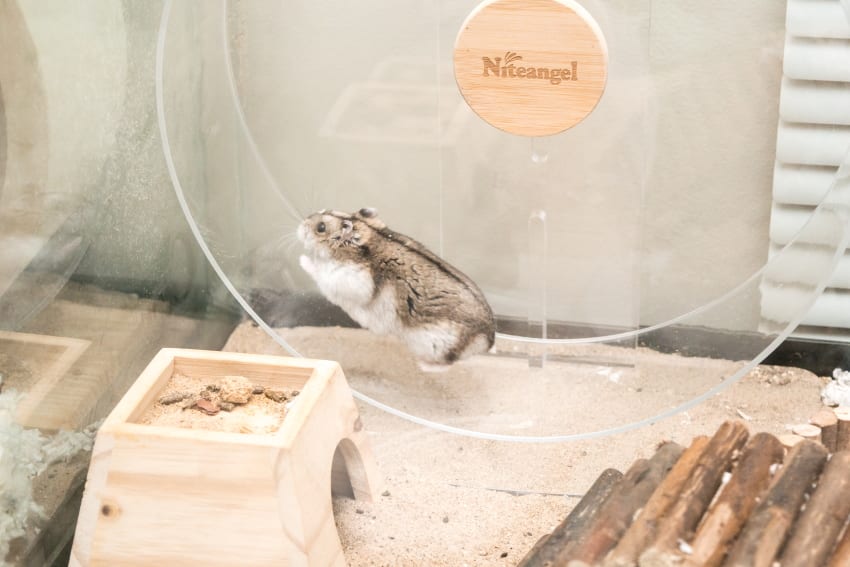
Hamsters require large wheels in their cages to fulfill their nightly running needs.
On the contrary, guinea pigs can injure their backs or overheat if given access to wheels. They prefer ample floor space to move around freely.
Guinea Pigs Are Calmer
Hamsters are known for their fast movements, which can make handling challenging, especially due to their small size. If you prefer a pet that stays calm and relaxed in your lap, guinea pigs might be a better match.
However, some guinea pigs may be skittish and may not enjoy cuddling. Proper handling techniques are crucial to ensure their comfort and well-being.
Hamsters Are Solitary While Guinea Pigs Are Herd Animals

Most hamster species, such as Syrian and Chinese hamsters, are solitary animals and should not be housed together due to territorial behaviors. In contrast, guinea pigs thrive in pairs or groups and should never be kept alone.
Male guinea pigs do best in pairs or with multiple females, while female guinea pigs can be housed together as long as they have adequate space and are properly bonded.
Guinea Pigs Are More Expensive
Guinea pigs generally require a higher financial investment compared to hamsters. Their larger size and constant feeding habits contribute to higher food costs.
Additionally, guinea pig cages need frequent cleaning, especially if using disposable bedding. Consider using reusable bedding like fleece liners to reduce costs in the long run.
Monthly expenses for two guinea pigs can range from $75 to $270+, while hamster care typically costs between $30 and $175 per month. Keep in mind that guinea pigs have longer lifespans than hamsters, resulting in higher lifetime expenses.
Hamsters Are Nocturnal

If you prefer interacting with your pet during the day, guinea pigs are a better option as hamsters are most active at night and sleep during the day.
Disturbing a hamster’s sleep during the day should be avoided unless necessary, such as for vet visits.
Guinea pigs are crepuscular animals, meaning they are most active at dawn and dusk. They prefer short naps throughout the day, totaling 4-6 hours of sleep.
Both guinea pigs and hamsters are suitable for individuals who work during the day, as they are most active during the early morning or evening hours.
Guinea Pigs Live Longer
Guinea pigs have an average lifespan of five to seven years, with some living up to ten years. In comparison, hamsters typically live for around two years.
For those concerned about the emotional impact of a pet’s passing, guinea pigs’ longer lifespan may be a deciding factor. On the other hand, hamsters require less long-term commitment.
Hamsters Are More Likely to Bite
Guinea pigs are generally docile and rarely bite unless provoked. Proper handling and care can help prevent biting incidents.
Hamsters, on the other hand, are more prone to biting, with small enclosures and improper handling being common triggers. Ensuring a spacious and enriching environment can reduce the likelihood of aggressive behavior.
Guinea Pigs Are Louder
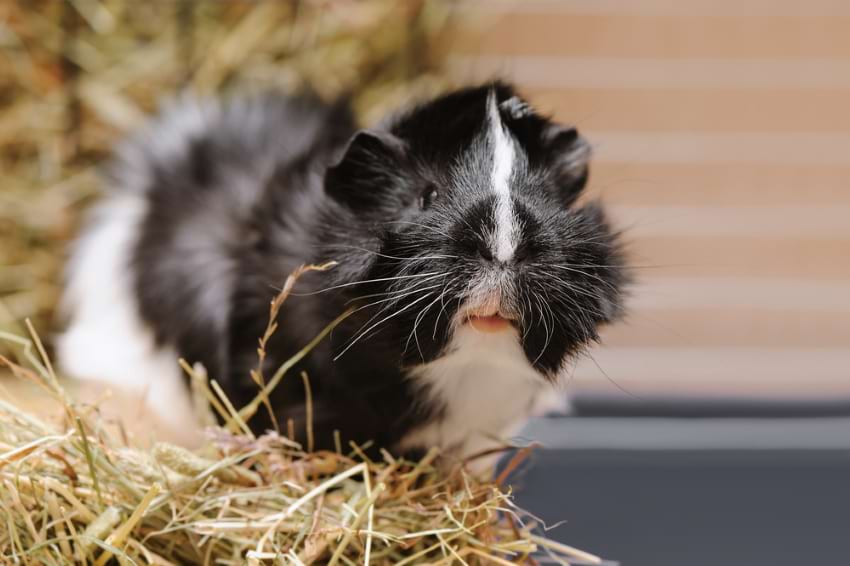
While hamsters make minimal noise, guinea pigs can be quite vocal, particularly when communicating with each other or seeking attention. Some guinea pigs may be more talkative than others, so be prepared for some noise in their living space.
Hamsters are quieter in comparison, with most of their noise coming from running on wheels. Guinea pigs, being larger animals, may make more noise while moving around their enclosure.
Hamsters Require Less Grooming
Guinea pigs need regular nail trims, whereas hamsters typically maintain their own nails. Long-haired varieties of both animals may require brushing and occasional fur trimming to keep them tidy.
Hamsters use sand baths for grooming, while guinea pigs groom themselves with their tongues. Bathing is rarely necessary for either species, but guinea pigs may occasionally need a bath to clean dirty areas.
Are Guinea Pigs or Hamsters Better Pets?
Both guinea pigs and hamsters can be wonderful companions, but the best choice depends on your lifestyle and preferences.
Adult caretakers who can provide proper care, regular cleaning, and gentle handling are ideal for these animals.
Hamsters are a good match for those who enjoy late-night interactions, prefer low-maintenance grooming, and value quiet and tidy pets.
Guinea pigs are well-suited for individuals seeking a calm and long-lived pet, willing to invest more time and resources in their care.
If you plan to have a single pet, a hamster is the way to go, as guinea pigs should always be kept in pairs or groups. However, if you’re considering multiple pets in one enclosure, guinea pigs are the more social option!

